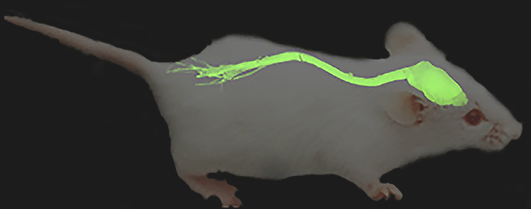PCR Genotyping
| Per reaction | $4.31 |
|---|
 We perform genotyping by a Universal Polymerase Chain Reaction Assay, including screens for induced mutations for colonies using our Husbandry Service. For breeding animals, assay results are normally obtained by two weeks of age. Primers for the Universal Polymerase Chain Reaction Assay must be 30 nucleotides in length, have 40-60% GC content, have non-homologous 3’ ends, contain no repetitive sequences, and produce an amplimer of 100-500 base pairs in length. We are happy to help with primer design if you provide the appropriate sequence, or you can see the Universal Genotyping Assay for more information.
We perform genotyping by a Universal Polymerase Chain Reaction Assay, including screens for induced mutations for colonies using our Husbandry Service. For breeding animals, assay results are normally obtained by two weeks of age. Primers for the Universal Polymerase Chain Reaction Assay must be 30 nucleotides in length, have 40-60% GC content, have non-homologous 3’ ends, contain no repetitive sequences, and produce an amplimer of 100-500 base pairs in length. We are happy to help with primer design if you provide the appropriate sequence, or you can see the Universal Genotyping Assay for more information.
We require that samples be submitted before noon on Fridays for processing the following week. Results will be sent to you by the following Friday afternoon. Please see the submission forms to submit the genotyping request form. You should include a hard copy of the form with your tissue samples. Tissue should be submitted in 0.2uL PCR strip tubes. We use VWR tubes, cat. #53509-306. For each litter, please clearly label the first tube with a unique identifier, such as AA, which denotes the litter ID. The rest of the tubes should be labeled with the sample numbers (2-6 etc.) on the side of the tube, not the cap, with permanent marker. Samples should be1-3mm in size. Please be sure that you push the tissue sample to the bottom of each tube for the digestion process. Place your strip tubes in an empty pipet box so that the samples remain upright and tails are not dislodged to the side or top of the tube.
Please fill out this form and e-mail to mgcpcr@kids.wustl.edu and place a copy of the printed form in freezer with tails. Label the tails with a simple scheme that is consistent between the tubes and the request form. Freezer is located on the fourth floor of the East McDonnell Specialized Research Facility just off the elevators. Contact Mia Wallace if you have not requested genotyping before or if you wish to set up new reactions.